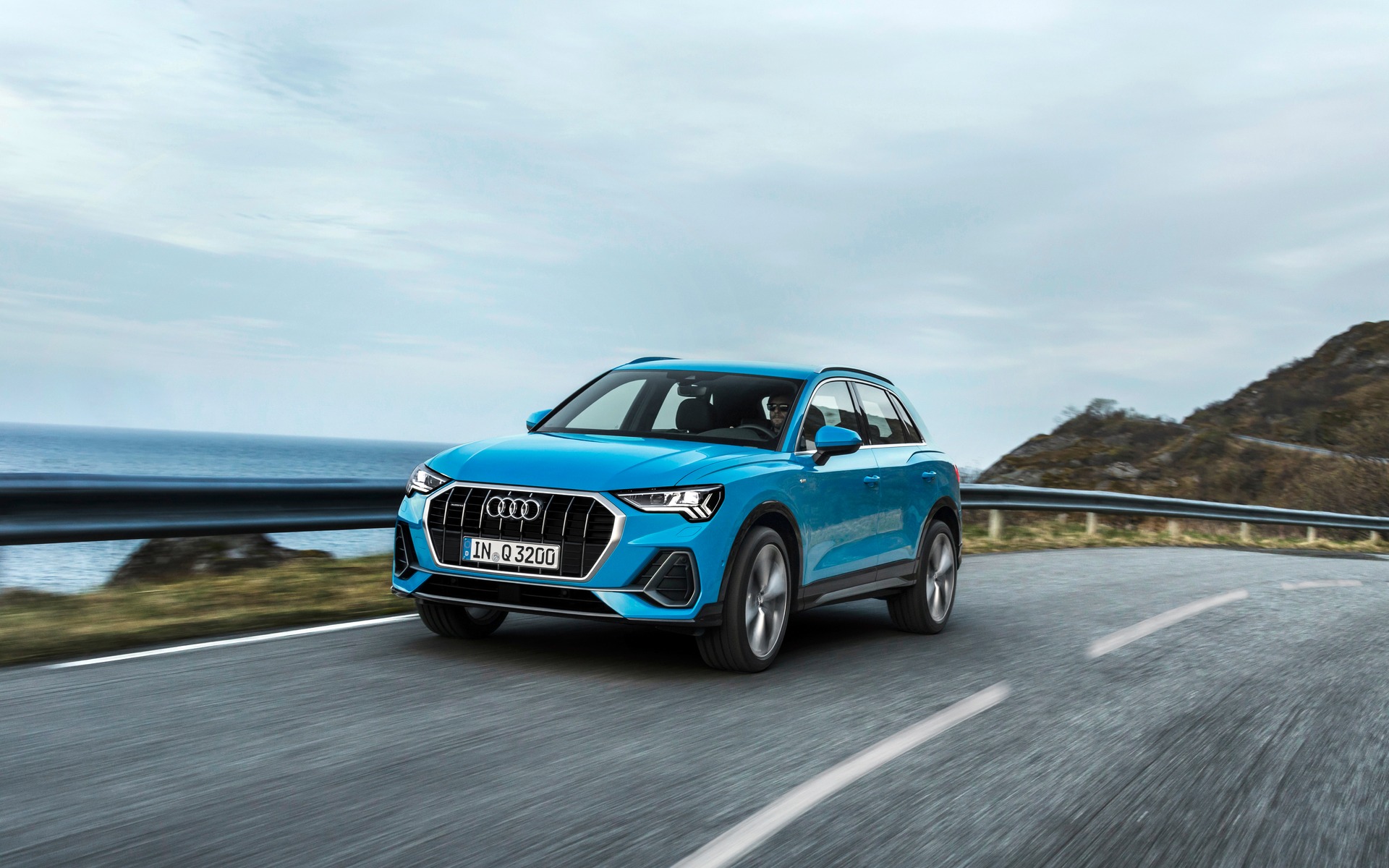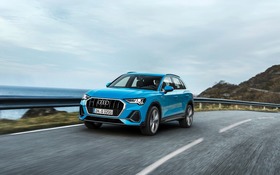2019 Audi Q3: Premium Class, Compact Size

| Strong points |
|
|---|---|
| Weak points |
|
Bolzano, Italy – With the second-generation Q3, Audi has created a compact SUV that is loaded with tech, and qualifies as a genuine premium vehicle with a cabin that is unmatched for refinement in this segment. More on that later, but first, here are the basics.
The new Q3 is built on the Volkswagen Group’s ubiquitous MQB transverse-engine architecture, and has grown considerably when compared to the outgoing model, as it is both 97 millimeters longer and 18 millimeters wider, while the wheelbase has been extended by 77 millimeters. The exterior dimensions, and longer wheelbase, translate into a much roomier and comfortable cabin as well as more cargo space. The styling is pure Audi with the requisite large Singleframe grille now sporting vertical slats and the so-called “quattro blisters” that extend slightly over the wheel arches, à la Audi A5. The overall impression is that the new Q3 looks more masculine than before and is almost a scaled-down Q8.
Two levels of power and torque
In Canada, the Q3 will be powered by two versions of the two-liter turbocharged four-cylinder engine, the lesser variant (Q3 40 TFSI) producing 188 horsepower and 236 pounds-feet of torque, while the more powerful version (Q3 45 TFSI) delivers 227 horsepower and 258 pounds-feet. All-wheel-drive will be standard on all Q3 sold in Canada, and the only gearbox available will be a seven-speed S Tronic automatic. In other markets, a 1.5-liter gasoline, as well as two diesel engines, are also available. During the international launch event for the Q3, we were only able to drive the more powerful 45 TFSI, so what follows relates to that specific variant.

On twisty mountain roads, the Q3 was composed and agile, the only downside being a slight delay in power delivery under full or almost-full throttle, which we will put down to turbo lag. It is not a deal-breaker and the Q3 will move when hustled around, but throttle is not as sharp as it could be. Having said that, it is easy to compensate by getting on the throttle just a lit bit earlier in the corners to get a good shot to the next one. In relaxed driving, the gearbox will shift through the gears early and smoothly to keep the revs and fuel consumption low.
Our test car was equipped with the top-level suspension system, complete with adaptive dampers, as well as the optional progressive steering system, which becomes more direct the more the driver turns the wheel, something that we came to appreciate while navigating seemingly countless hairpin turns through the Dolomites. The Q3 felt balanced and handled well, the only downside being the not-that-impressive level of grip provided by the Hankook Ventus S1 evo2 SUV tires. On the highway, the on-center feel is very good and the Q3 felt very stable even at higher-than-legal speeds where it also proved to be very quiet thanks, in part, to a windshield made of acoustic glass.
Upscale interior
But what really sets the Q3 apart from its immediate competition is the very upscale look and feel of its cabin. Simply put, the Q3 does not feel like a compact SUV, it feels like a luxury car with high-quality materials and excellent fit and finish. Our test car was equipped with optional Alcantara accents, with a strip of this suede-like fabric running on the horizontal area of the dashboard and on the door armrests that is available in three colors, including a bold orange. It is just a small detail, but it really gives the cabin a very premium feel. Also available is a contour/ambient lighting package that enables the driver to select from thirty different colors and also backlights the quattro logo on the passenger side of the dashboard. Very cool.

The design of the dashboard echoes that of the Q8 with a large driver-oriented color touchscreen with haptic feedback for the infotainment system, and the 12.3-inch virtual cockpit display features on the Q3 as well. However, the Q3 makes do with conventional HVAC controls. Apple CarPlay and Android Auto are standard as are two USB ports up front, one of them being USB-C compatible for faster charging. Rear seat passengers get two USB ports as well as a 12-volt outlet. The only drawback is that the audio system’s volume knob is now located over on the passenger side, but the Q3 also gets steering-wheel-mounted controls for audio and other systems. Cargo volume is rated at 530 liters with the second-row seats in their rear-most position. Slide the rear seats forward and you now get 675 liters of cargo capacity. Drop the rear seatbacks and 1525 liters of space becomes available.
Driver assistance tech
The Q3 also comes with safety and driver assistance features such as crash detection systems that warn the driver if a collision is imminent and can also initiate emergency braking. Lane-departure warning and active lane assist are also standard, while adaptive cruise control, rear cross traffic alert and 360 degree cameras as well as an automatic parking system are offered as options.
The new-for-2019, second-generation Audi Q3 is a very impressive package that delivers on style and sophistication. It will arrive at Canadian dealerships in the second quarter of 2019 with pricing information becoming available closer to market launch.











